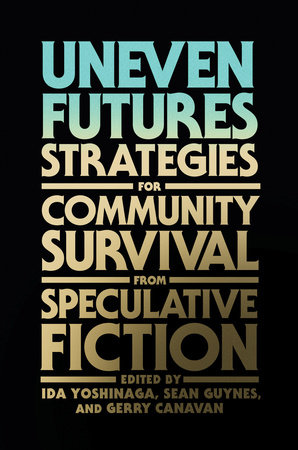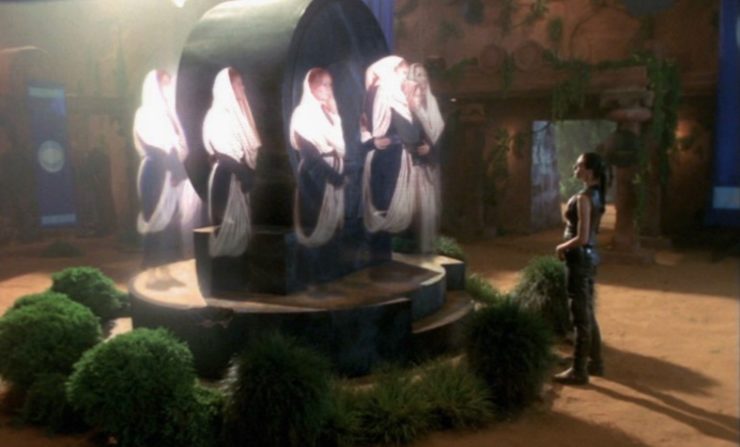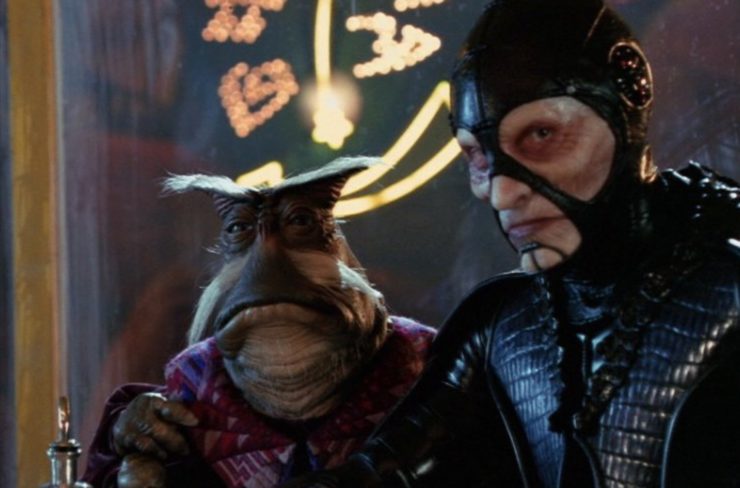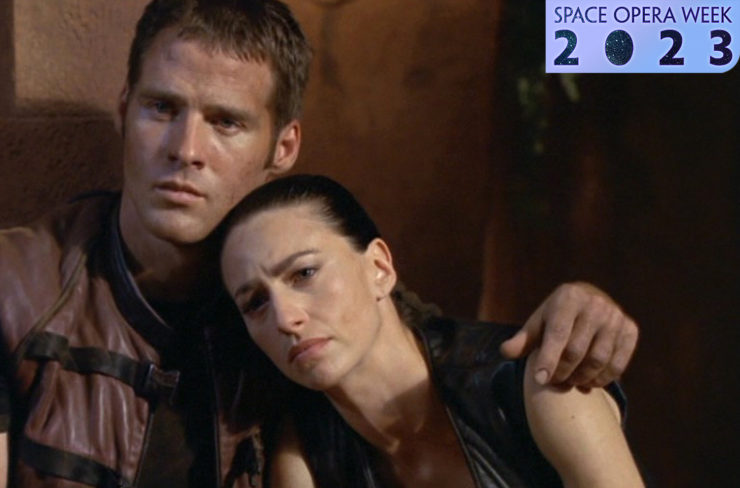There’s a simple selling point I trot out when trying to get anyone to watch Farscape, and I think it still hits the mark nearly twenty years after its finale: “Imagine you were watching Star Trek, but this time, instead of your intrepid spacefarers helping people wherever they went, the crew of the Enterprise ruined everything all the time.”
It’s an important framing because shows like Farscape inevitably exist in conversation with Trek, which dominated the entertainment landscape in those days. (There were two Star Trek series on the air when Farscape premiered, though Deep Space Nine had nearly completed its seminal run.) So many genre television projects existed to try their hand at the template Trek had built, and their goal was either to mimic the formula (Stargate SG-1, SeaQuest DSV) or upend the conceit entirely (Babylon 5, reboot Battlestar Galactica). Farscape was firmly in the latter camp, and employed several former Trek writers to that end, asking the question: What if no one on the ship ever wanted to be here in the first place?
Buy the Book


Uneven Futures: Strategies for Community Survival from Speculative Fiction
Most shows featuring space travel involve a group of people who chose to be on their respective journeys. Whether they joined a Federation or need to haul cargo to eat, everyone boards their boat for the same or similar reasons—it’s how they make a living. But Farscape begins with an astronaut getting Buck Rogers’d across the galaxy via a wormhole, and arriving mid-battle as a ship of escaped prisoners is breaking free of their captors. Dragged aboard the former prison transport (her name is Moya, she’s alive by the way), he has to contend with the passengers, a disparate group who never had any intention of spending time together once they were free.
As is often the case with these sorts of stories, the crew of Moya somehow weave themselves into a family, forced to see each other through a number of harrowing ordeals as they move across the Uncharted Territories. But one fact of that journey continued to pull me back time and again while I watched the show as a kid: Very often, their interference in the situations they stumbled across made things worse rather than better. They’re meant to be our heroes, imperfect though they may be, yet they are constantly fucking it up.
A perfect example of this dynamic is encapsulated in the episode “…Different Destinations,” an early entry in the show’s third season. Right on the heels of losing a very dear friend, John Crichton (that’s the human astronaut) and several of his cohort are visiting a planet shrine while their ship is undergoing repairs. Said shrine contains these weird temporal goggles that allow visitors to see back through time to a very important battle where thirty Peacekeeper soldiers died to defend kids and nurses from the Venek Horde, and eventually created terms for a ceasefire. This is already awkward on the propaganda front as the Peacekeepers of the current era are a purely fascistic force bent on galactic conquest, but things get trickier when their pal Stark has the goggles forcibly jammed on his head—they thought he’d enjoy a look at peace, you see—and Stark’s unique empathic spiritual abilities wind up shoving his friends back through time to the battle itself.
The instant they arrive in the past, their friends in the present note changes to the planet. Whoops.
While the group in the past are keenly aware that their actions might change the future, every attempt to avoid that scenario fails. This is partly down to causality making it fairly impossible for them not to muck things up, but is also entirely down to everyone acting on their emotions: Jool is injured the second she arrives and spends all of her time in screaming pain, frantic to leave; Aeryn learns that the historical Peacekeeper hero Sub-Officer Dacon was no dutiful soldier, but a cook promoted due to circumstance, and she immediately wants to protect him from his fate; D’Argo makes a connection with a young child named Kelsa, who he also wishes to protect; Crichton keeps trying to recreate the original ceasefire and botching it in ever more subtle ways.
Every alteration to the timeline manufactures a worse situation in the present—the planet is run by the Venek Horde, then it’s a decimated, lifeless surface, then it’s irradiated, and finally it vanishes from existence. Not a single attempt to put things right results in a better or even restored version of events.
When the crew finally make it back to the present, the shrine is there once more, but erected to an entirely different purpose: No longer the site of a peaceful end to conflict, it now exists as a monument to the murdered nurses and children. When you look through time in those temporal goggles, you can hear one of them screaming for Crichton, who had assured the group that, if they left, their lives would no longer be in danger. Everyone is traumatized by what they went through, and angry at how their presence once again led to violence and death for people they barely knew—it’s hardly the first time this has happened.

Time travel stories like this are often little puzzle boxes, a fun exercise for a writer to conceive of a few cute paradoxes that can link up in the end for a tidy completion. But in Farscape, it was used to the polar opposite purpose. There is no puzzle box. There is no neat resolution. There is no quick fix to a wildly difficult problem. There is only the aftermath of your own poor choices, even when you tried as hard as you could.
This is one of the more extreme examples, but it happens constantly throughout the course of the series. Zhaan helps to ween a stranger off a super-soldier drug, only to have him elect to use the drug again immediately after he parts company with her. Stark attempts to free a group of his own enslaved people, and instead they’re killed. Scorpius and Rygel interrupt a cook’s attempt to burn his diner down for insurance money, leading to his death instead. The crew’s errors cause Moya to conceive a Peacekeeper-Leviathan hybrid ship, and then to later lose Moya’s child to a Peacekeeper captain. They eventually gain a reputation as harbingers of destruction who are capable of outrageous feats by the sheer volume of their own massive screw ups. But the specter of their consistent failures follow, often fragmenting their little family as everyone tries to handle heartbreak and loss as best they can.
And yes, this is a large part of what makes the show incredible. A key factor in its appeal, if you will.
I’m not so edgy as to tell anyone that a withholding of comfort and solutions leads to better storytelling. It’s more surprising, certainly, but I don’t subscribe to the suggestion that a lack of safety in fiction is better by virtue of surprise alone. It can become its own manner of trope for one (how many murder weddings can we fit into one historical era, Westeros), and the idea that art always has to shake us up in order to be truly meaningful is exhausting and also, more importantly, false. We can learn a lot from quiet decency and softer bravery. You don’t have to be traumatized in order to learn or experience something transformative.
However… it is a fact of life that the majority of us will spend our days fucking up. Not because we’re terrible people, but because it’s an inevitable side effect of being here. And popular fiction can often have a hard time showcasing that aspect of life in a way that feels true.
I needed Farscape to show me that side of the equation. I needed to know that it was common to try and common to fail. And I needed to know that when I failed, a nice captain-type wouldn’t be there to tell me that making mistakes and still losing were a part of life—that instead, I might just be non-functional for a few days. I might forget how to speak, I might scream into empty vast nothingness, I might have long conversations with a neural clone of my worst enemy (i.e. an imaginary friend who gives you terrible advice) in my own head about how wrong I’ve been. I might break and everyone around me might be broken, too. I needed to know that we’d keep going all the same because that’s what you do, and often for no reason more profound than that.

And I also needed to know that sometimes fucking up could be fun. Or, at the very least, that the absurdity of existence would never fail to be funny. John Crichton saved himself from a coma by self-inserting into his favorite childhood cartoons. He accidentally swapped consciousnesses with his fellow shipmates and got to spend time inhabiting the body of his lover. He taught a robotic repair drone on a dying ship to hum the 1812 Overture. He was swallowed by a budong and got the thing to vomit him up. He became the most wanted man in the galaxy, surrounded by aliens strapped into leather fetish gear. You know, just the usual profligate madness that pops up all over the place when life does its thing.
So you see, I describe Farscape the way I do because I consider it to be the highest compliment: Ruin more things for me, please. We all define hope by different parameters, you know? And for me, there is often nothing so hopeful as proof that nothing ends with failure. Because there’s no way to know how capable you are until everything goes wrong—and you’re still here.
Emmet Asher-Perrin talked about Farscape—the way it taught viewers to cultivate radical empathy and how to build a community that acknowledged and accommodated a wide array of disabilities—in Uneven Futures: Strategies for Community Survival from Speculative Fiction. So you could go grab a copy and read more of their Farscape thoughts, if you like. You can bug them on Twitter and Tumblr, and read more of their work here and elsewhere.











In many ways, Farscape reminded me of the 1980s British TV show Blake’s 7, which appeared to be run on the idea of “Imagine you were watching Star Trek, but the Federation were the fascistic bad guys.” Also with escaped prisoners and lots of screwing up and leaving devastation in their way — but with much lower production values.
I love Farscape. It’s weird, funny, disturbing, ticks every classic scifi episode trope in a fresh way (body swaps! shrink rays! heists! time travel!), almost every Australian actor (who still lives there) shows up at one point or another, and watching John transform from a bewildered scientist/pilot to being driven nuts to complete badass is a joy to behold.
Gosh I loved that show, with all of it’s terrible, wonderful madness.
@1: I agree with the Blake’s 7 comparison, though maybe crossed with Red Dwarf (speaking of the whole screwing up theme).
The thing that I always use to hook people on Farscape is asking “How many shows have you seen where the hero mourns the people he hurt while getting away?”
Because that, to me, is the heart of Farscape – Our Hero actually cares about the people around him, whether they’re part of his chosen family or not, and he cares about helping his family be better people.
In the pilot, he says to Aerin “You can be more”, and that is a thread that runs through the entire series. It’s complex and layered and got the strongest moral center despite the shades of gray. Maybe I’ll rewatch it this week.
Dang, I need to re-watch Farscape again.
Interesting that this post should show up now… I’m currently rewatching Farscape on the free streaming service, Tubi TV. Brings back a lot of memories.
How I loved that show! I remember being heartbroken when it was cancelled after several seasons.
“Imagine you were watching Star Trek, but this time, instead of your intrepid spacefarers helping people wherever they went, the crew of the Enterprise ruined everything all the time.”
I would argue that many times Enterprise did ruin things by the end of the episode. A few examples, but by no means a complete list:
1) The Apple. The natives are happy, if somewhat dumb, but they have a nice deal going. Kirk and company come in and blow it all.
2) A Piece of the Action. Sure, the planet is run like the 20s gangs, but they seem to be doing pretty well. Not bothering anyone, content to live their lives, and in time the system would moderate out as the larger gangs assimilate the smaller ones. But no, Kirk has to put his nose in where it doesn’t belong.
3) Space Seed. Leave a megalomaniac criminal on his own planet with zero supervision or observation? Seriously?
TNG, DS9, VOY, ENT, they all had similar outcomes at times.
Agree wholeheartedly with this post, and the commenters about the Blake’s 7 connection, the actress playing Grayza once commented she modelled herself on Servalan!
To be frank, I wish it was still on today. It was a show that offered itself the opportunity for renewal of cast and premise just as much as Trek or Doctor Who. There’s been nothing quite like it since in terms of blending comedy, pathos, drama (although the Expanse, which shares some of the creative crew, sometimes gets close, particularly in crew dynamics – isn’t James Holden very like John Crichton in the way that he takes the weight of war on his shoulders?).
I didn’t even have to read the article (though I did). I knew what episode you were talking about just from the headline. This is one of my all time favorite episodes of television.
I see several people have said this already, but I can’t help adding my voice to the chorus:
Boy did I love that show.
Maybe a rewatch is in order.
I adore Farscape, but I think the funniest thing is that a lot of what’s described in this as subverting tropes in this article is literally… also exactly what happened in Voyager (shot through a wormhole by accident! nobody wants to be there! Half of them are wanted criminals, they’re kind of terrible and make lots of enemies and do actually ruin everything wherever they go!). The difference being that Farscape comes out of the box with a viable reason for absolutely everyone being chaotic and desperate (and when the characters choose loyalty and kindness, it means that much more), and Voyager pretends that it’s all FINE and some kind of demented Federation status quo while they go about causing wars and wreaking havoc in the Delta Quadrant. And while Farscape will always be the most deliberately batshit and demented, the sheer naff absurdity of Voyager’s salamander babies and WWF tie-in wrestling also deserves an honourable mention surely?
I’m not saying Voyager is good most of the time, but if you’re going to compare Farscape and Trek for exactly those reasons, then.. Voyager probably ends up being the most relevant part of that conversation :)
I’ve watched approximately 3 seasons of Farscape. Really interesting show, with a fun space opera vibe to it that is missing from a lot of contemporary sci-fi. Not much in the way of social justice either, though they do get in a couple of gender-bender jokes, e.g. a very masculine looking humanoid alien who states “I am the female of my species”. A great show.
I’m surprised no one has mentioned Lexx. Another show that featured a cast of lovable screw ups.
@9: The Star Trek comic book series that DC published back in the late 1980s had a follow-up on The Apple which I believe addressed some of these concerns.
Like everyone here, I loved Farscape. I didn’t watch it when it came out, but a bit later and it never seemed too dated. I loved that the different alien species/cultures were actually thought through instead of just humans with different forehead bumps like you see on most of these types of shows. Using the Henson puppets helped make Rigel and Pilot real characters and in Gigi Edgley’s portrayal of Chiana you could see how she used her body to move in different ways than humans normally do. It was an excellent show with real feeling characters and I’m going to go rewatch it tonight now lol
At the end of the series, Sci-Fi did the ultimate screwup by failing to do the fifth season, opting to toss it out the airlock to pick up Stargate SG1.
At least they did the two part TV movie (two parts is NOT a miniseries!) “Peacekeeper Wars” which I assume distilled a main plotline that would have run through the fifth season.
I didn’t start watching Farscape until 2016, so I was very late to the game, but I absolutely fell in love with the show. When I adopted my cat, I knew I was going to name it Moya if I wound up with a girl and Crichton if I wound up with a boy, and lemme tell ya, trying to get people to spell and pronounce Crichton correctly has been a huge pain. I must admit I stopped watching at the end of season 3, because I was so torn up. I have yet to go back and finish it, but I will one of these days.
@18 That’s my assumption on Peacekeeper Wars too. You can sort of see what would have formed the basis of the individual arc episodes throughout the season and the in-betweens where the crew would have had a different make up, or certain characters would be separated from the main cast for a while. But in two or three hours of whatever it is, none of the new characters get the time to be fleshed out and a lot of the big moments and shock-switches get lost because of the pace.
That plus them forgetting how to do Pilot’s voice, and Noranti being played by a different actor in some of the shots, make it all a bit of a shame. Although it did help me past the trauma of that season 4 cliffhanger!
I can sum things up this way, Star Trek never made me cry!
Star Trek had good stories. I cared about the Farscape characters.
This closing statement
And for me, there is often nothing so hopeful as proof that nothing ends with failure. Because there’s no way to know how capable you are until everything goes wrong—and you’re still here.
did more to make me decide to give this show a try than any of the times friends recommended it. So I have added it to my FreeVee list and shall see where it takes me! Thanks!
I always enjoyed the episode of Voyager where Janeway digs out three people who hid in the depths of the ship and they are *happy* there, more or less, till she finds them (my dad, a veteran of WWII, always had great sympathy for them because he had a sergeant kind of like her).
Of course, if they ever saw what happened on Moya, they would count themselves lucky that Janeway only found them for one episode…
Then again, it would have been fun to add Murderbot to Voyager or Moya (though Seven would help Murderbot find more good soap operas).
Dear lord I love Farscape. Killjoys is right up there too.
Love Farscape! Thank you Emmet for this description of Farscape. Watching the show 4 times through, I knew exactly every scene you described. Loved “there’s no way to know how capable you are until everything goes wrong—and you’re still here.” Maybe something we could all think about these days?
Loved Farscape! Ït is also the only sci-fi where the romance feels real, everyone seems so stiff to me on Star Trek (sure they do commradary ok, but not romatic love).
When re-watching you need to be careful to wath first season in correct order per the DVDs (not the streaming order on Prime).
It got so much right but a few glaring errors always niggle at me. John is wearing a football helmut in the first episode, a space helmut should be air tight, Then in I. ET the aliens are able to understand John even though they had supposedly had no cotact with aliends before and werent given the translator microbes. Anid in season Billy is referred to interchangeably as John’s nephew (correct) and cousin.
Totally agree with the sentiment “there’s no way to know how capable you are until everything goes wrong—and you’re still here.” Aeryn, John, DÁrgo and Pilot all got to “be more.
I think others are correct at noting that there were other shows (including Star Trek) that allowed for failure, but what was unique about Farscape at the time was how it allowed its characters to absorb those failures, and change. Star Trek required its characters to remain pretty flat and static so that episodes could be shown out of order in syndication, and you could still understand who everyone was. Within those confines, Star Trek often still managed to do some excellent character work. But in Farscape they tossed that out early on, and the characters are all significantly changed people by Season Four.
Farscape is all about character development and we as earthlings are supposed to root for the clueless of all the main characters. In the other shows alike characters are less important than their functions /rank, they are all part of strong army / bureaucracy and everyone of them could be replaced on their ship by another officer of equal rank. Farscape is all about misfits and loosers who just aim for survival and try to navigate through intrigues which makes it more relatable than everybody being an admiral with a deep political agenda